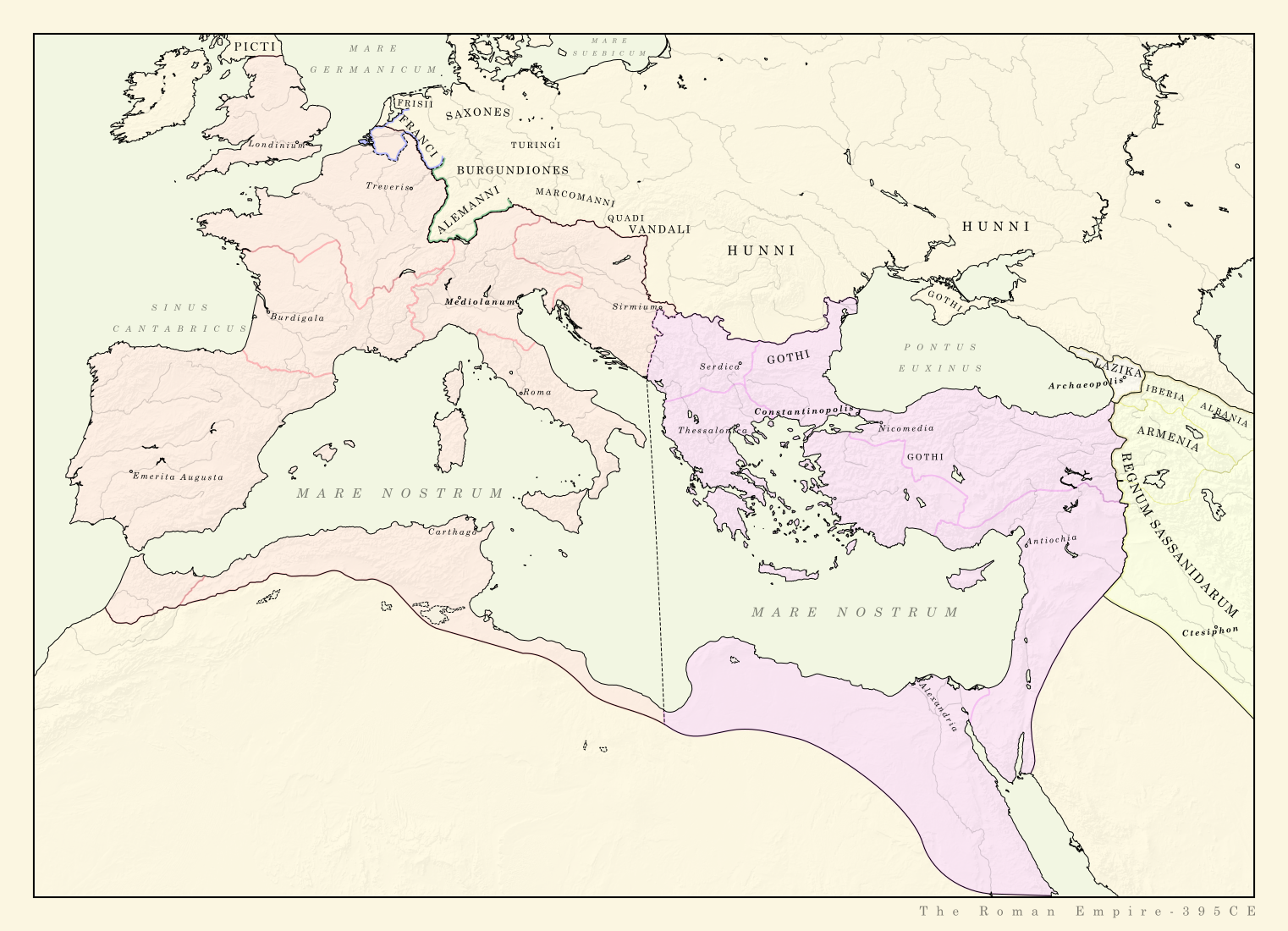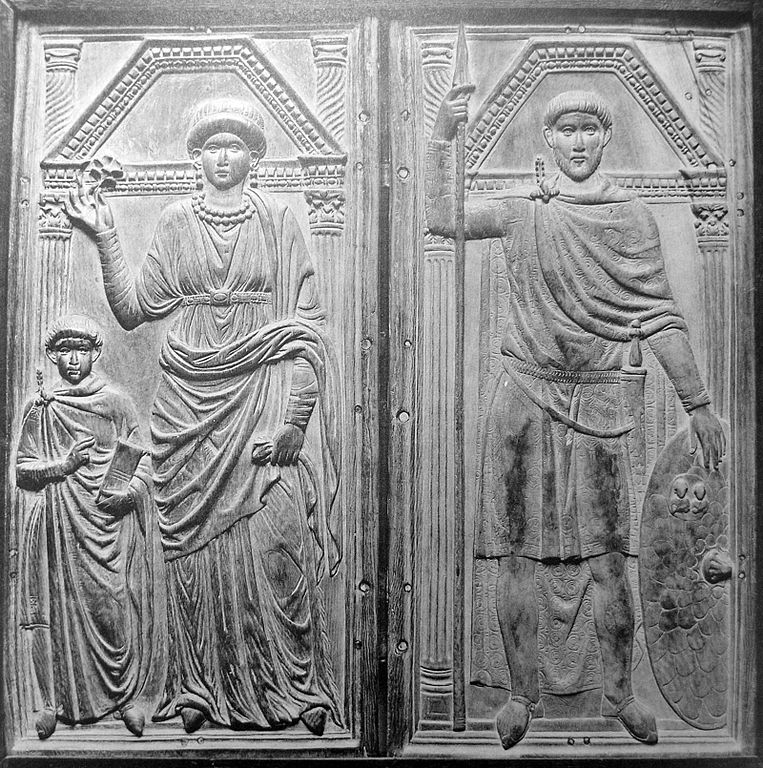Prologue: The Roman Empire at the End of the 4th Century
Araldyana
Araldyana is the promised land for us glorious children of Aeneas. There the Lord will come again in glory to judge the living and the dead. The kingdom of Christ will have no end but it will have a beginning. From the far shores of the west it will enlighten this doomed world.
- Emperor Levelin II
(Seven centuries after the POD)
(Seven centuries after the POD)
Prologue: The Roman Empire at the End of the 4th Century
Emperor Theodosius, son of the comes [1] of the same name, became co-ruler of the Roman Empire in the year 379. At first his rule was confined to the eastern half of the empire but after the death of Emperor Valentinianus II and the defeat of his rival Eugenius he extended his rule to the western part as well. By his death in 395 he had secured his dynasty’s future by placing his two sons Arcadius and Honorius on the thrones of the East and the West.
The young emperors, Arcadius was 17 and Honorius 10 years of age, faced several problems after their father’s death. On the one hand the pressure on Rome’s borders and on the other the tension inside the empire - both were tightly interwoven.
The outside pressure the Roman Empire faced from the land of the Barbarians had several reasons. One of them was the prosperity of the Empire. The Barbaricum was by no means barren land but the Empire with its riches was nevertheless appealing to the peoples of northern and eastern Europe. This should not be misunderstood as barbarians trying to conquer the Roman world. Instead they usually attempted to integrate into the already existing system. Barbarians that were allowed into the empire could be a chaotic or stabilizing force, depending on the circumstances.
Another reason for the pressure on Rome’s borders were the advancing Huns. They either subdued the Iranian and Germanic peoples of Europe or they pressed them west into the empire. The Goths had before the Huns arrival controlled large parts of eastern Europe but have since split and migrated. Some groups became part of the Hunnic domain, others entered the Empire of the Romans. Accepting the Goths into the empire gave Rome soldiers and the Goths arable land. They kept their religion (mostly Arian Christianity but also Germanic Polytheism) and some autonomy. That the empire was in need of soldiers was a result of the plagues, civil wars and conflicts with Persia that bled dry the Roman army. An event that devastated the west of the Empire was the Civil War of Theodosius and Eugenius [2], which decimated the Western army.
The Goths, as well as other barbarians, were mostly Christian by the end of the 4th century as were the Romans, but the Goths adopted Arianism, a branch of Christianity labeled heresy in the Roman Empire. After crossing the Danubius and slaying emperor Valens the Goths settled and were settled in regions that can be considered of highest importance to the empire, such as Asia Minor and Moesia [3], both in close proximity to Constantinople. Their different culture, heretical religion and military power caused suspicion in the Roman aristocracy and the general population.
Even other, more peripheral regions, like Britannia in the north-western corner of the Roman world had to deal with barbarian incursions. The Celtic Picts posed a threat to Rome's possessions on the island since emperor Claudius first conquered it but hitherto they always had been repelled. The south of the island in the meantime had to deal with piracy. Some of the Saxon raiders that haunted the shores of Britannia have found employment in the Roman Empire to secure the coast of northern Gallia and Britannia. The prospect of being part of the relatively stable empire has not only an appeal to the peoples of eastern Europe but even to the raiders of the Roman shores. Individuals like the magister militum [4] Bauto, the comes Arbogastes and the regent of the west Stilicho have shown the Roman world that men of barbaric ancestry can rise high in the hierarchy of the empire. Their example has inspired people like Alaric, leader of the Goths of Moesia, to call for a better position for him and his people. The death of Theodosius and the weakness of the empire have now given him the opportunity to rise higher than all his ancestors before him.
_ _ _ _ _ _ _ _ _ _ _ _ _ _ _ _ _
[1] Comes
A Roman military title. A comes was a commander in charge of a part of the imperial field-army. A dux in contrast was a commander in charge of border troops. In OTL “count” is derived from comes , whereas “duke” is derived from dux.
[2] Civil War of 393-394
Theodosius defeated Eugenius and became ruling emperor of the whole empire. Despite being stylized to a war of religion - Christian vs. Pagan - the conflict was deeply rooted in politics. Both emperors were Christian even if Eugenius was more tolerant than Theodosius. After the war Trinitarian Christianity became the empire’s sole state religion.
[3] Moesia
A region on the western Balkans. Moesia Inferior and Moesia Superior were two provinces along the lower Danube. I use the term Moesia to refer to the general geographical region rather than the provinces.
[4] Magister Militum
A high Roman military title meaning “master of soldiers”. The office of magister militum can be limited in terms of geography (e.g. magister militum per Illyricum) and troop type (foot soldiers or cavalry). In the aforementioned cases their office was all encompassing both in terms of geography and troop type, making them effectively second in tank only to the emperor.
_ _ _ _ _ _ _ _ _ _ _ _ _ _ _ _ _
The Roman Empire 395

Last edited:

